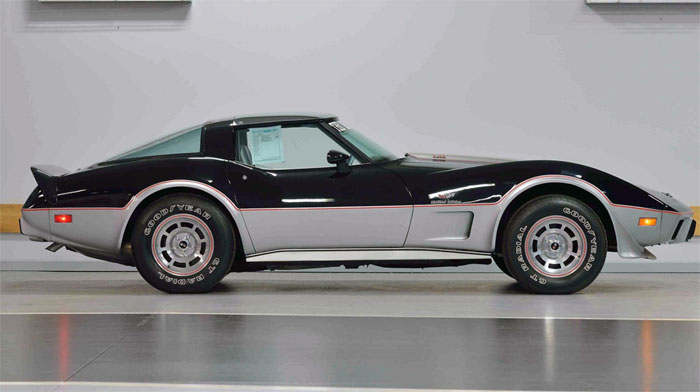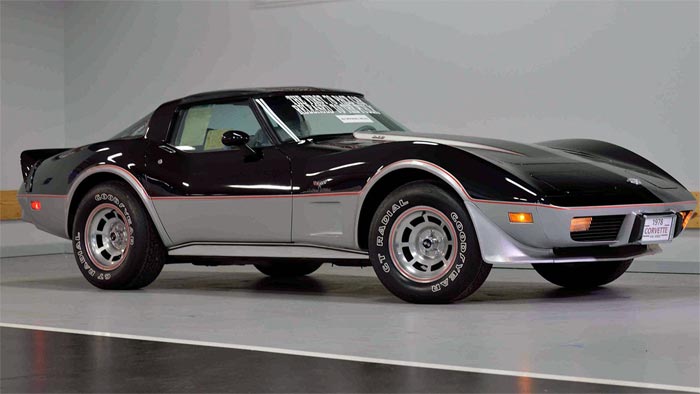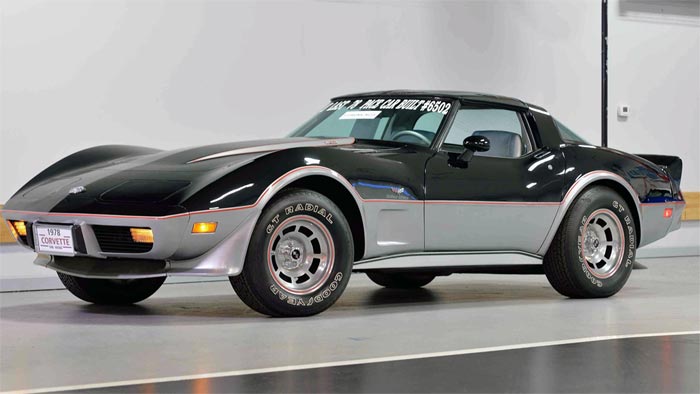It took 39 years, but these numerically significant pair of 1978 Corvette Indy Pace Cars finally came together, in the city that they were named after no less. The pair of Black/Silver limited edition Corvettes come from the legendary Bob McDorman Collection and were offered separately at no reserve at Mecum’s Spring Classic in Indianapolis.
The first Pace Car available to the public (bearing VIN 1Z8478S900003) sold for $57,500 and the very last Pace Car produced (marked with VIN 1Z8748S906502) was auctioned for $110,000.
In case you’re wondering what happened to 001 and 002, the first was kept by Chevrolet and the second was given to Al Unser Sr. for winning the 1978 Indy 500. The book-end Corvettes were predicted to bring between $50,000 and $75,000 each, well above their original sticker price in the $13,000s.
When the Pace Cars began production, a story in The Wall Street Journal proclaimed them a great collectible sure to appreciate in value over the years and the prices suddenly soared to $20,000, $40,000, or even $75,000 as Corvette Fever swept the nation.
It’s not uncommon to find Pace Cars nearly 40 years later with very, very low mileage as lots of owners back in the day socked them away in a garage, waiting for a big payday in the future, and never enjoyed driving them. As a result, they’ve never really become the hot collectible we all expected in 1978.
However, these two well-taken-care-of examples could be the exception to that rule due to their collectibility with their status of being the first and last Corvette Pace Cars. Well, that plus the tremendous care that has been given to them over the ensuing decades.
VIN 003 has only 42 miles on the ticker and was delivered new to Grossman Chevrolet in Minneapolis, Minn., while its “younger brother” has gone just 52 miles.
VIN 003’s list of goodies includes the original window sticker and EPA sheet still intact on the glass, L82 engine, 4-speed manual transmission, Gymkhana suspension, AM/FM radio with CB and power antenna, mirrored glass T-tops, silver leather interior, power steering/brakes/windows/locks, tilt/tele steering column, polished aluminum wheels, decals still in the box, commemorative jacket, pillow, and vintage photos. The car was delivered new to Grossman Chevrolet in Minneapolis, Minn.
VIN 6502 also has the same features (but only an AM/FM radio – sorry about that, good buddy). It also includes a commemorative jacket, window sticker, build sheet and shipping receipt, T-top covers, owner’s manual and maintenance schedule, decals, miscellaneous magazines, and copies of previous titles.
The Corvettes were from the late Bob McDorman’s extensive collection of Chevrolets, many of which have low VINs. Before he passed away in 2015, the Indy Pace Cars were parked in his Museum’s office with one on each side of his desk.
Source:
Mecum.com
Related:
[GALLERY] The 2017 Corvette Grand Sport Paces the 101st Indianapolis 500
Corvettes on Craigslist: Needy 1978 Corvette L82 Indy 500 Pace Car
Nebraska Farmer Buys Lambrecht Chevy’s 4 Mile 1978 Corvette Indy Pace Car
-







Watching the Mecum Indy auction I could not believe the number of cars with low original mileage that went across the block. It made me wonder why so many of these “squirrelled away” low-mileage classics were up for auction. Are the people who squirrelled them away starting to die off, or looking to sell off their collections before they die? Are they concerned that the market for classic cars might dry up soon because the baby boomers who salivated over these cars when they were younger are now through their “mid-life crisis” years, and the younger generations coming up behind them seem to have little or no interest in classic cars? Or are they concerned that North American cities might soon start imposing driving restrictions on older fossil-fuel powered vehicles, similar to those that we are hearing about in cities like Paris, France, and that such restrictions may further dampen the market for classic cars?
Comments are closed.